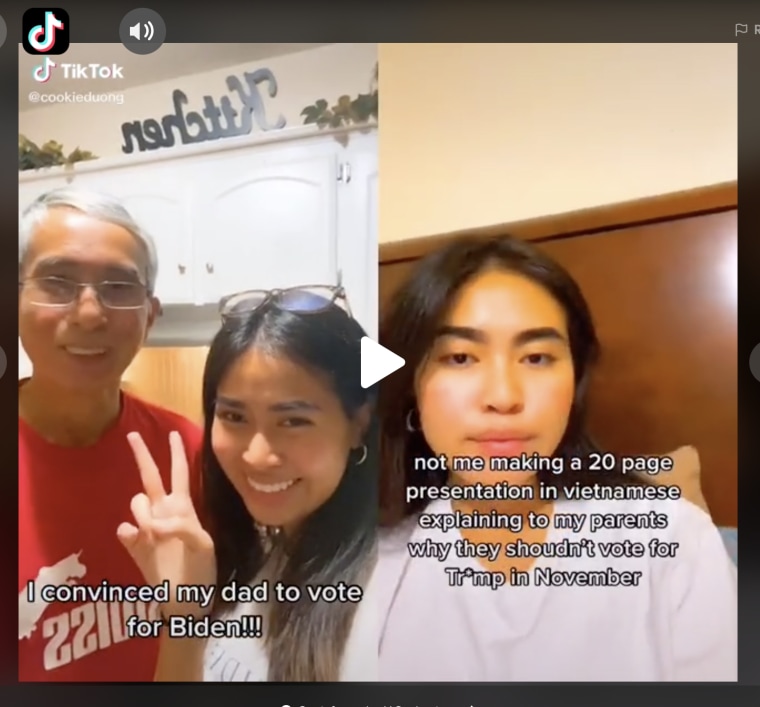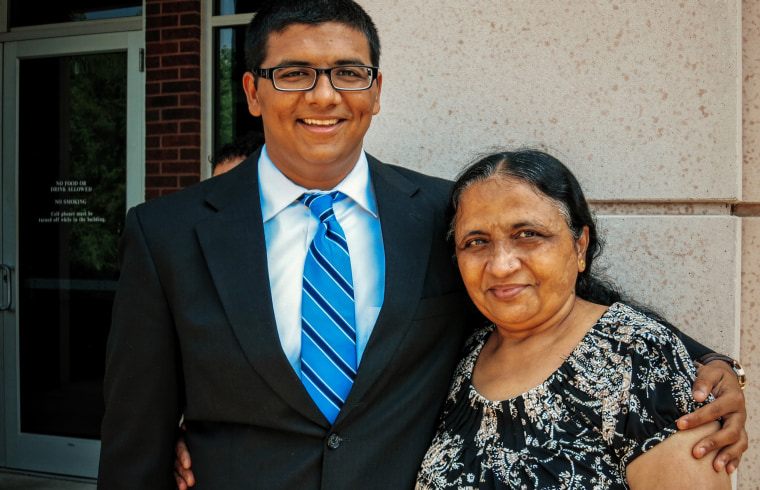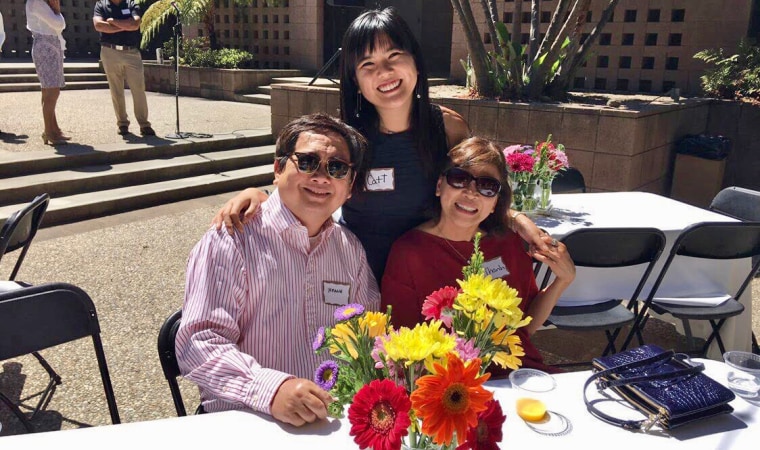Cookie Duong was at home in Oklahoma City a month before the election when she posted a TikTok she didn't expect to go viral.
“Not me making a 20 page presentation in vietnamese explaining to my parents why they shouldn’t vote for Tr*mp in november,” the text on the video said.
Duong, 22, was, in fact, doing just that.
Duong’s father was often difficult to communicate with when it came to politics, she said. Like a majority of older Vietnamese Americans, he’s always been more conservative, Duong says, but this election year she wanted to make a “last-ditch effort” to try and persuade him to not vote for President Donald Trump.
Her TikTok got 34,000 likes, which shocked Duong. Perhaps more shocking: the powerpoint convinced her dad to vote for Joe Biden. When she posted her success story on TikTok the next day, it got even more traction, and other young Vietnamese Americans with Trump-supporting parents started reaching out.
“People started asking, ‘Hey can I get the link to the PowerPoint?’ The requests were so overwhelming… And then there are actually some success stories,” Duong said.

Duong’s story in this election cycle was somewhat common. In a year where a pandemic stopped traditional campaigning outreach efforts like in person events and door knocking, some voters became far less accessible than usual. And specifically for Asian American voters, who report being reached out to by campaigns at a rate of 42-50 percent – the lowest of any groups – young people in these immigrant communities stepped up to organize and engage their parents, doing often invisible work and filling a void that campaigns have left empty for years.
Yash Mori has seen the lack of outreach firsthand. As a community organizer in Washington, D.C., and digital consultant who worked with the campaign of Sen. Cory Booker, D-N.J., in the primary and worked with non-profits who supported Joe Biden, he knows the resources and budget it takes to reach immigrant voters. This year, for the first time, he organized his Indian American parents in North Carolina and helped them get registered and cast their first ballot. But if he hadn’t been there to help, his parents probably wouldn’t have voted, he said.
“There was a lot of calls from Democratic organizations and the Biden campaign for my parents landline and their cellphones and things like that and they got added to random text groups … But I feel like there wasn't anything native that they understood to be able to mobilize them,” Mori said.

“This is sad to say but honestly if I didn't drive down to North Carolina from D.C., they wouldn't have voted, because there wasn't any native communication where somebody was saying, here is messaging in your language in Gujarati or even Hindi that we're going to call you, and convince you, or mobilize you to vote.” Mori’s story tells a bigger picture trend, too.
Studies have shown that kids who have parents who vote are more likely to vote themselves, building a tradition of voting within families that moves top to bottom. But for some immigrants, there is often no tradition of voting to build on.
Studies have shown that kids who have parents who vote are more likely to vote themselves, building a tradition of voting within families that moves top to bottom. But for some immigrants, there is often no tradition of voting to build on.
Children of such immigrants essentially have to build tradition upward and sometimes influence their parents’ political beliefs and voting decisions in the process.
That influence is something the campaign of Sen. Bernie Sanders, I-Vt., actually started building on in 2016 to grow his support among Latino voters. Older Latino voters tended to support Hillary Clinton, but the campaign found younger Latinos latching onto Sanders’ message and convincing their parents to support him, too.
“In Vegas, in Arkansas, in Iowa, it was young people as young as 12 years old who were coming to our campaign offices, or those who were Dreamers who didn’t have the power to vote… they were actually the ones mobilizing our families, they were the ones registering them to vote and they were the ones explaining policies to their families,” Cesar Vargas, Sanders’ national Latino strategist in 2016, said.
Vargas also points out the pivotal role kids in these communities play given the “oversight” of campaigns not to specify their outreach to different nationalities within the Latino community. Asian American community organizers often say the same problem impacts the Asian American and Pacific Islander community too; there is so much diversity within what it means to be Asian American that a cookie-cutter approach will not carry through to turnout.
And this year, It wasn’t just candidate education and voter registration and getting their parents to actually cast a ballot. Fighting rampant misinformation also became a role kids of immigrants played at home.
Duong, whose parents consume their news in Vietnamese, saw for years how older Vietnamese Americans turned to right-wing Vietnamese pages on Youtube, which spread inaccurate information about politics and the pandemic.
Even before she created her powerpoint in the fall, Duong started a website June 5 called ‘The Interpreter’, which translates news articles into Vietnamese. It became a project in combating the spread of fake news in her community but also a way to better explain the movements like Black Lives Matter and the protests after police killed George Floyd in Minneapolis to strengthen the language barrier that sometimes exists between some immigrant parents and their children.
Catt Phan, 24, a Vietnamese American who grew up in California, also has a conservative father who vehemently supported Trump. She sometimes tried to talk to him about her own political beliefs, but the language barrier stood in the way. With just weeks until Election Day, she turned to Duong’s website and powerpoint for help.
“Throughout my conversations with my dad I usually would just be silent, because I just didn't have the language, or the vocabulary to argue back with him,” Phan said, “My Vietnamese is solid, but talking about you know anti blackness … I didn't know those words in Vietnamese, so I felt very young in comparison to him.”
My Vietnamese is solid but talking about, you know, anti-blackness....I didn't know those words in Vietnamese, so I felt very young in comparison to him.
Catt Phan, a Vietnamese American who grew up in California, also has a conservative father who vehemently supported Trump
Once she sent her father Duong’s powerpoint in an email, she said he agreed not to support Trump, but said he would rather not vote at all than vote for Biden. Ultimately, her father said he’d vote for Biden, but the organizing work, Phan said, is still ongoing.
And as all eyes turn to Georgia for the Jan. 5 runoff election, that ongoing at-home organizing will be critical for Democrats in the state who are hoping to flip both Senate seats blue. Asian American voters are in the margin of victory in the Peach State and helped turn Georgia blue for the first time since 1992.
Ian Tang, a 25-year-old whose parents are from Hong Kong and live outside Atlanta, has been walking the tight rope of political beliefs with his mom since 2016 when she voted for Trump. But after years of difficult conversations with Tang looking for windows of opportunity to communicate about politics and fact-checking Facebook posts, even by September, his mom still wasn’t sure whom she’d be voting for. Tang learned after the election, the Saturday the results were announced, that his mom voted for Biden this year.
But how she’ll vote in January? He’s not sure.
“I'm very excited but also nervous about January,” Tang said.
“I bought an [Jon] Ossoff sweatshirt that I’m wearing back to Atlanta for Christmas, so I’m sure that will be a topic of conversation.”
Follow NBC Asian America on Facebook, Twitter and Instagram.
